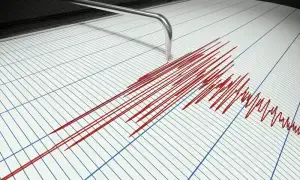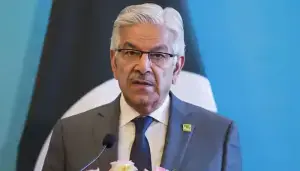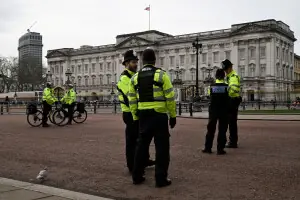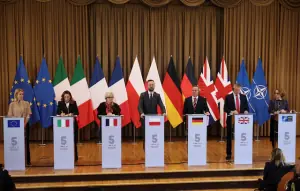Risk of Ukraine energy shock poses fresh test for pragmatic Qatar emir
4 min readDUBAI: Qatar's crisis solving skills face a new diplomatic challenge on Monday when its emir meets President Joe Biden to examine a possible role for the Gulf state in cushioning the economic aftershocks from a potential Russian invasion of Ukraine.
Already a diplomatic broker for the West over Afghanistan, and occasional go-between on Iran, the latest potential job for Sheikh Tamim bin Hamad al-Thani plays to Qatar's strength as a resource giant -- protecting Europe from an energy supply slump.
Washington would like Qatar, one of the world's biggest producers of liquefied natural gas, to boost LNG supplies to Europe in the event that an invasion disrupts Russian gas flows to the continent, and if contracts can be adjusted. Russia denies planning to attack Ukraine.
The energy security aspect of the Ukraine standoff, among issues on the agenda in Biden's White House talks with Tamim, offers a fresh opportunity for the tiny state of barely three million people to punch above its weight on the world stage.
It would become the latest in long line of crises in which Tamim, and before him his father Sheikh Hamad bin Khalifa al-Thani, used a complex web of friendships nurtured by Qatar's gas riches to become a go-to mediator in global diplomacy.
"Under Tamim, the country has managed to maneuver strategically into becoming a deeply significant player on several prominent files, most blatantly Afghanistan in recent months, by leveraging contacts, tremendous wealth, and it's worked out well for them," said H.A. Hellyer, a scholar at the Carnegie Endowment for International Peace.
Hamad, who abdicated in 2013, made it a trademark of Qatari diplomacy to maintain relationships not only with Washington and its regional allies but also with U.S. rivals such as Iran, the Palestinian Islamist group Hamas and Lebanon's Hezbollah.
He helped Western strategic aims, including by hosting the largest U.S. military facility in the region -- a base that played an important role in the 2003 Iraq invasion -- but also favoured Islamist groups in the 2011 Arab Spring uprisings.
Tamim's visit to the White House, the first by a Gulf Arab leader since Biden took office last year, comes just months after Doha played a key role in evacuations in the chaotic final U.S. withdrawal from Afghanistan in August. It has since become the U.S. diplomatic representative in Taliban-ruled Afghanistan.
Qatar is also uniquely positioned to influence efforts to revive Iran's 2015 nuclear deal with world powers. Qatar's top diplomat visited Iran on Thursday, days before Tamim holds talks in Washington that are expected to cover the pact.
Iran has asked Qatar to broker the release of dual-national Iranian-Americans and Iranian-Europeans jailed in Iran.
Tamim’s Qatar seeks foreign and energy policy leverage "as a means of soft power to buy credit in the West rather than the East," said Andreas Krieg, an Associate Professor at King's College in London.
"Because of its fairly neutral position, actors such as Iran and the Taliban see in Qatar an intermediary who, although it stands up for principles that align with the West, can engage with regional needs and grievances in a far more understanding manner."
World Cup spotlight
Tamim, now 41, was little known when he was declared heir apparent in 2003, eight years after Hamad seized power from his own father in a bloodless coup in the absolute monarchy.
Since then Tamim has stamped his own authority on Qatar, one of the wealthiest nations per capita.
A big test came in 2017 when Saudi Arabia and three Arab allies imposed a trade and travel embargo on Qatar, infuriated by its links to the Muslim Brotherhood, Tehran and the Taliban.
That dispute has been mostly resolved now, and analysts say Tamim managed to exploit it, deepening ties with the United States and Europe and regional countries such as Turkey, which has a military base in the Gulf state.
"His position at home was elevated by the shared trauma of the regional boycott imposed by Qatar's neighbours," said Kristin Diwan, senior resident scholar at the Arab Gulf States Institute in Washington.
Qatar, which hosts the Middle East's most influential TV channel Al Jazeera, will soon come under close international scrutiny.
Doha hosts the World Cup in November and December 2022, and while it plans a warm welcome for fans, it faces criticism from rights groups for what they call its harsh treatment of guest workers who labour in blistering sun to prepare for the event.
Tamim is acutely aware of the need to keep close ties with Washington as he faces human rights scrutiny. Biden has said he would take a tough line on abuses in the Middle East.
So Qatar has worked hard to keep Washington on its side, analysts say.
While its role on Afghanistan has been helpful, more important has been large Qatari state investments in the U.S. economy, said a Western diplomat in the Gulf. "It's also made significant donations to universities and think tanks that employ U.S. politicians when they're not in office," he said.
Gerd Nonneman, Professor of International Relations and Gulf Studies at Georgetown University Qatar, described Tamim as gregarious, able to talk to international policymakers and "the more traditionally tribal-oriented folks in Qatar and the Gulf."
For the latest news, follow us on Twitter @Aaj_Urdu. We are also on Facebook, Instagram and YouTube.
























Comments are closed on this story.